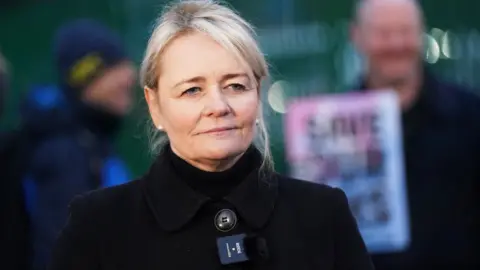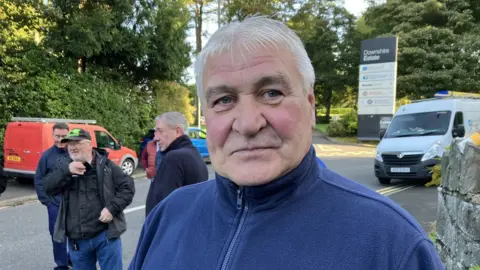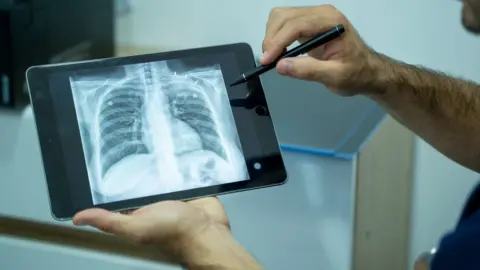Strike action: Thousands of health workers walk out over pay
Health and social care staff in Northern Ireland have said they are "not fourth class workers" as they walk out in a 48-hour strike as part of a pay dispute.
The industrial action by Unison, Unite and Nipsa members involves some nurses, ambulance and hospital support staff.
Northern Ireland health and social care staff remain the lowest paid in the UK.
They are yet to be offered a pay uplift for 2023-24 and received an below-inflation pay award for 2022-23.
NHS workers in England received a 5% increase in 2022-23 and a one-payment of at least £1,655.
The three unions will be joined on the two-day strike by the Society of Radiographers (SOR).
The Chartered Society of Physiotherapy (CSP) will also strike on Thursday from 08:30 to 12:30 BST while the Royal College of Midwives (RCM) will strike on Friday from 08:00 to 16:00.
Margaret McKee, from Unison, who is striking on the picket line in Belfast, said health workers were not treated well in Northern Ireland.
"We are not fourth-class health workers we are first-class health workers - we are not going to back down," she said.
Beth Lockhart, a radiographer, said seeing workers in England being paid more was difficult.
"We aren't getting paid enough as it is and then to see people in England kind of having that - we haven't been awarded a pay offer for this year either - so we're kind of nearly two steps behind where we should be," she said.
 PA Media
PA MediaUnite said 4,000 of its members would join with colleagues from other health unions in one of the biggest strike actions in years to affect the service.
"It is scandalous that NHS workers - who only a couple of years ago were being clapped by our politicians - are once again forced onto picket lines," its general secretary Sharon Graham said.
She added that "the blame for this lies squarely with the Conservative Secretary of State for Northern Ireland Chris Heaton-Harris, who has enforced a punitive and completely inadequate budget on the health department".
"At the time when the health service in Northern Ireland is losing critical services due to staffing pressures, health workers in the region once again face being left behind on pay," she said.
"That will only make recruitment and retention of staff even more difficult and redouble the staffing crisis."
The SOR said it was taking out members in every trust in Northern Ireland in an effort to tackle the recruitment and retention problems affecting the radiography profession - which have left almost 10% of the country waiting for diagnostic tests.
Its members voted in favour of industrial action in order to secure improvements to pay and conditions, increase recruitment and retention of radiography professionals - and thus cut waiting times for patients.

James Creggan, a NHS driver, said he decided to join a picket line in Downpatrick after other parts of the UK received a pay rise.
"There are people doing the same job as us but getting better paid," he told BBC News NI.
"I think we are being discriminated against to be perfectly honest and the people in Stormont won't go in and give us what we are entitled to."
Cora Regan, Northern Ireland national officer for the SOR, said its members say they regularly work over and above their contracted hours to care for patients and attempt to reduce waiting times.
"The pressure to increase working hours, coupled with low pay, means that many radiography professionals are leaving Northern Ireland - or the profession itself - and they are not being replaced in adequate numbers," she said.
 Getty Images
Getty ImagesThe Department of Health has said it is expecting significant disruption to services as a result of industrial action on 21 and 22 September.
It said that intensive work has been carried out to try and mitigate impact on the public where possible, but some reductions in service are inevitable.
It said information on impacts from industrial action is provided on health trust websites.
'Deep-seated frustration'
The department said it understood the "deep-seated frustration over the ongoing absence of a pay offer for this year but very much regrets that colleagues have decided this industrial action is required".
In setting out the implications of the budget it received for 2023-24, the department said in May that it was facing an "impossible position" and that decisions were required that were not in the best interests of the health and social care system.
The department said that, as previously stated, "the current budgetary constraints mean that matching the English pay offer for Agenda for Change health and social care staff would require large scale cuts on an unprecedented scale, with severe and lasting implications for services."
It said that would be outside the scope of its decision-making powers, but it continues to look for ways to address the pay challenge.